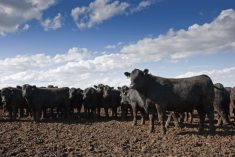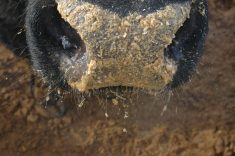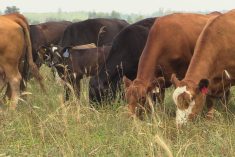Compared to last week, western Canadian yearling prices were unchanged; however, calves weighing 550 to 800 lbs. traded $3-$5 lower. The market for calves under 550 lbs. traded $5 lower to $3 higher. Early in the week, prices were showing some strength in the lighter weight categories but buying enthusiasm waned from Wednesday through Friday. Feeder cattle futures incorporated a risk discount due to rising COVID cases in Canada and the U.S., which resulted in lower cash values.
The prolonged period of negative margins in the feedlot sector has caused cattle feeders to be risk-averse. If the cattle don’t pencil a profit from the start, they’re not putting up their hands. This rally in the barley market is also not over; offers for spring delivery are carrying a $20 premium over nearby prices, and that’s if you can find an offer. We’re moving into the final month of 2020 and the market appears to be lacking demand. It looks like year-end buying won’t be a feature this year; after last spring, the cattle feeder-investor has not returned or is buying limited volumes.
Read Also

U.S. grains: Soybeans rise on China demand hopes; corn and wheat rebound
Chicago Board of Trade soybean, corn and wheat futures rose on Monday on signs of progress towards the end of a record-long U.S. government shutdown, along with expectations of a revival of U.S. soybean exports to China, analysts said.
In southern Alberta, Angus-blended steers weighing just over 950 lbs. were quoted at $174 while Hereford-based heifers averaging 960 lbs. were valued at $157. Mixed medium-frame steers that were fed light grain ration averaging 860 lbs. were quoted at 172 in the same region. In central Saskatchewan, Charolais steers with medium flesh levels averaging 830 lbs. were quoted at $184 and exotic heifers weighing 810 lbs. were quoted at $164. In central Alberta, mixed steers carrying heavier butter averaging 870 lbs. were valued at $170.
In Manitoba, Simmental-based steers averaging 680 lbs. were quoted at $186 and Charolais heifers weighing just over 700 lbs. reportedly sold for $172. In central Saskatchewan, tan steers weighing 610 lbs. with full health records traded for $196. In southern Alberta, vaccinated unweaned black steers weighing 550 lbs. were quoted at $219 and similar quality heifers weighing 510 lbs. were valued at $190. South of Edmonton, mixed steers on full health program weighing 450 lbs. were quoted at $238 and mixed heifers with similar specifications averaging 500 lbs. were valued at $190.
The nearby market news is negative; there is no doubt about it. In 90 days, this feeder market will turn around. There is bound to be some type of COVID vaccine rollout in Canada and the U.S in the first quarter of 2021; secondly, the U.S. Department of Agriculture is factoring in a year-over-year decline in first-quarter beef production, which will rejuvenate the fed market. This country was built on “next year” and there are no truer words in regards to the feeder market.
— Jerry Klassen manages the Canadian office of Swiss-based grain trader GAP SA Grains and Produits Ltd. and is president and founder of Resilient Capital, specializing in proprietary commodity futures trading and market analysis. Jerry consults with feedlots on risk management and writes a weekly cattle market commentary. He can be reached at 204-504-8339 or via his website at ResilCapital.com.















